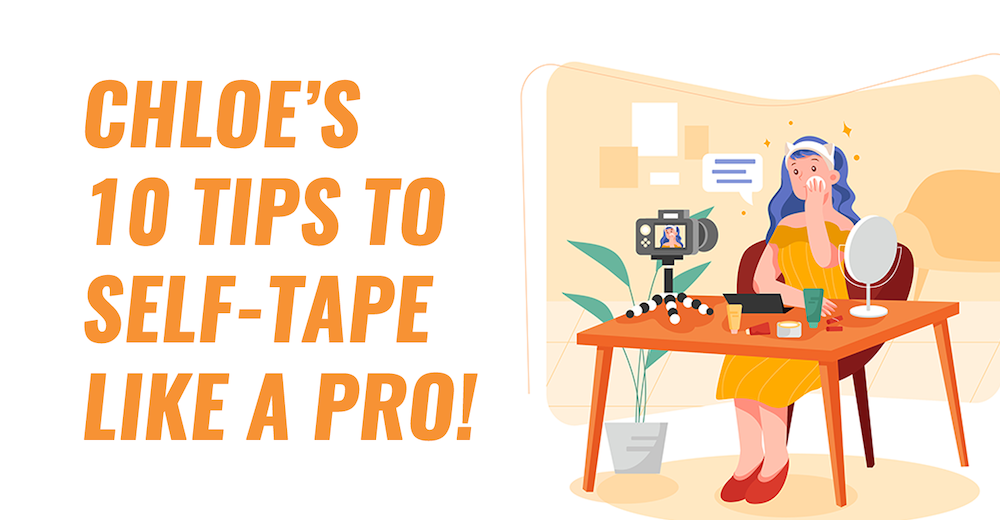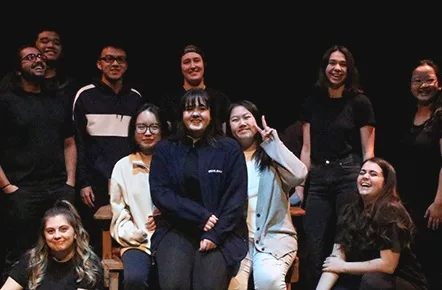In recent years, self-tapes have gained popularity as a great way for actors to submit an audition from the convenience of their own homes. However, filming a self-tape can feel pretty daunting, so we’ve gathered ten tips that we think will help you to shoot incredible auditions. Whether you’re looking to add to your general acting know-how, or (hint hint) preparing to apply for UBC Players Club’s Fall 2022 Mainstage, The Importance of Being Earnest, this is the post for you!

1. Do Your Research!
Before you jump right into choosing material for your self-tape, set aside some time to look into the show you’re auditioning for. Take note of the genre, the location or time period in which it’s set, and any characters you may want to play. All of this information can be incredibly helpful when selecting material for your audition! As a general rule of thumb, it’s best to find a monologue that fits the tone of the play (or role) that you’re auditioning for. You might have an amazing comedic monologue already in your repertoire, but that won’t help the director see how your talents would fit into a tragedy. Understanding your source material is a great way to ensure that you’re setting yourself up for success!
2. Highlight Your Strengths!
Auditions are all about showing the casting directors why they should consider you for their show- so naturally, you want to use your audition to highlight what you do best! When choosing audition material, look for monologues that allow you to demonstrate your individual strengths as an actor. The best pieces are ones that allow you to show a range of your capabilities all within one performance. In other words, avoid pieces that are one-note, and look for ones that allow you to play with transitions or beat changes. If you can nail a character arc in a 60-second audition tape, you’re showing your directors that you’ll be incredibly prepared to play a dynamic character in a full-length production.
3. Practice, Practice, Practice!
Once you’ve found your material, it’s time to rehearse! Since self-tapes are fairly short, most casting directors will expect you to be off-book, meaning that you can recite all of your lines without a script. Memorizing a monologue can feel pretty intimidating, so make sure to give yourself enough preparation time so you don’t need to stress about learning your lines at the last minute. When memorizing your lines, it may help to begin by splitting the piece into sections rather than attempting to learn everything at once. Once you’ve perfected each section, you can join them back together and have an amazing monologue ready to go! Don’t be afraid to ask friends or family members for help rehearsing. Hearing some feedback can be really useful during the preparation process!
4. Choose the Right Angle!
When filming a self-tape, you’ll typically want to use a medium close-up frame, which means you’ll be filming from your chest to just above the top of your head. Make sure the camera is at eye level or just above it. You can always stack some books as a DIY tripod if you need a little extra height! As for the background, try to find something neutral that won’t distract the casting director from your performance. A solid-coloured wall in a subtle shade like white, grey, or blue works perfectly.
5. Check Your Tech!
Before launching into your Oscar-worthy performance, it’s a good idea to do a test run of your recording equipment so that you can troubleshoot any issues that may come up. Film a short clip of yourself saying a sentence or two in the location you’re planning to use, then watch it back to ensure that the lighting and audio quality are satisfactory. It would be such a drag to have to re-film your entire audition due to technical difficulties, so a quick test run can be a total lifesaver!
6. Remember Your Listener!
When filming a self-tape, chances are you’ll be the only actual actor in the room. However, in the context of your chosen material, your character is likely speaking to someone- whether it’s another character, a group of characters, or even the audience! As you say your lines, remember to visualize who you’re speaking to and how their reactions to your words may influence your character. It can sometimes be helpful to place an object at eye level off-camera to act as a reference point for where a listener might be. That way, if you need to make “eye contact” with this person at any point in the scene, you’ll have a consistent point to focus on.
7. Take Your Time!
Typically, directors will ask that your audition falls within a specific time limit (such as a 30-60 second monologue). You may be tempted to rush through your material to make sure that you can fit everything into the time limit. Even while performing a monologue, it’s important to allow for beats (or pauses) to occur in the scene! As you film, allow yourself time to breathe and pace the lines in a way that makes sense in the context of the scene. If you’re consistently going overtime, it may be time to look for some new material!
8. Don’t Strive for Perfection!
One of the joys of self-tapes is that they provide actors with the opportunity to film a couple of takes before they settle on one they’re happy with. However, don’t fall into the trap of starting over for every little mistake! It’s so easy to allow your inner critic to take over and end up filming dozens of takes in order to get the “perfect” one. This will take up so much time and just result in you feeling super frustrated, which isn’t the best headspace to be in during an already stressful process. Remember that casting directors don’t expect perfection from you, so you shouldn’t either! It’s okay to shoot a few takes, but that’s really all you need.
9. Celebrate!
Make sure you put aside time after submitting your tape to reward yourself! Auditioning is super intimidating, and sending in a self-tape is a major accomplishment. Whether you treat yourself to a Starbucks drink at UBC, run a relaxing bubble bath, or make dinner plans with a friend, it’s so important that you find a way to practice self-care and de-stress after completing any stage of the audition process.
10. Keep Trying!
If you don’t hear back this time, don’t get discouraged! Remember, every director has a certain vision for each new project they embark on. Just because you weren’t quite what they were looking for this time doesn’t mean they didn’t still love your audition, and it certainly doesn’t mean you shouldn’t audition for other projects in the future! Even if you don’t land the role, each audition is an opportunity to gain more experience and challenge yourself as an actor. If you keep trying, your hard work is bound to pay off!
Thanks so much for reading! If you’ve got more tips, please let us know, and if you’ve got any auditions coming up, break a leg! We know you’ll be amazing. 💙🧡


